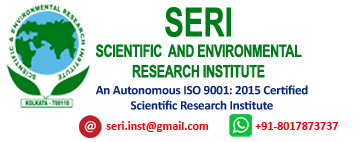About SERI
The Scientific and Environmental Research Institute (SERI), Kolkata was established on the occasion of the World Environment Day on 5th June 2006. The motivation for the establishment of this institution has been based on the issues of environmental education discussed in the deliberations at Founes in 1971 and later at Stockholm in 1972 followed by the workshop on Environmental Education at Belgred in 1975 and also on the resolutions and recommendations of the Intergovernmental Conference on Environment at Tbilisi in 1977 organised by UNEP and UNESCO. The Institute has been organising since its inception different programmes having social, educational, cultural, economic and positive content for the optimum development of a sustainable society. The Institute has provided training to more than one thousand persons in the areas of ecology, environment, pollution control, disaster management, sustainable development, ecological tourism and environmental education. Other programmes conducted by the institute include ecological education in more than 100 schools of West Bengal in collaboration with the Sikkim Manipal University, publication of more than 10 books, occasional monographs etc.
The Institute has been a pioneer in organising national and international congresses and conventions on environment. Between 2006 and 2020 more than 25 national and international congresses and conventions were organised including the famous World Clean Environment Summit. The Institute has collaborated with many Indian and foreign universities for helping them to design the latest curriculum on environment at graduate and postgraduate levels. The Institute has implemented many programmes at the global level for making the world citizenry aware regarding the need to protect our mother earth.
The idea behind establishing the Scientific and Environmental Research Institute (SERI) is to reach the grassroot level with a view to implement the programme of "catch them young" by 2030 by reviving the planet ecologically through environmental policing of the global commons and setting up of a global environmental legislative wing, regeneration for eco-restoration of eco-fragile areas on the verge of irreversible decline, ecotone restoration of river systems as well as biodiversity for managing the third millennium and the twenty first century.

